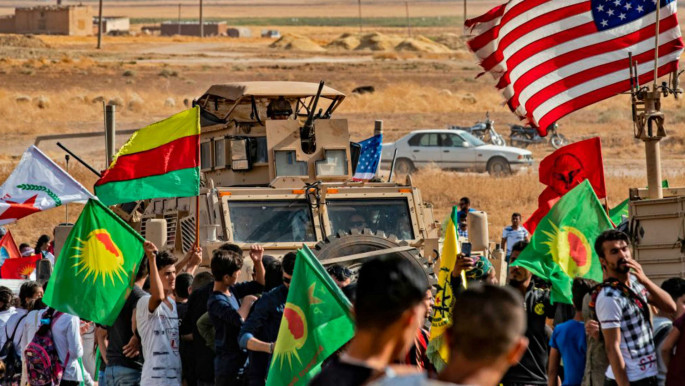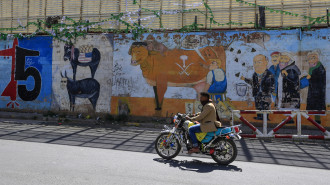The Daughters of Kobani: A Kurdish story of rebellion, courage and victory over IS
The Daughters of Kobani: A Kurdish story of rebellion, courage and victory over IS
Book Club: Gayle Tzemach Lemmon's book is a riveting account of how an all-women Kurdish militia, aided by US Special Forces, racked up strategic victories against the Islamic State group.
6 min read
A riveting account of the heroic female fighters, who took their revenge on IS
It was mid-2014, and the international coalition led by the United States was carrying out airstrikes on Islamic State in Iraq and Syria (IS) targets. One of the biggest challenges they encountered then was the absence of a ground force capable of retaking the territories held by the marauding terrorists.
At the same time, the Kurdish Women's Protection Units (YPJ), an all-women militia, inspired by the left-leaning ideology of Abdullah Ocalan, the founder of the Kurdistan Workers' Party (PKK), was fighting against IS to defend their villages in northern Syria.
And it turned out to be a poetic justice that the violent extremists, who tore through the region terrorising town after town and kidnapping, enslaving and brutalising women, were handed their first defeat in the small town of Kobani by these brave, capable women fighters, aided by the US intelligence and occasional airstrikes.
The extremists could never have thought that those hapless women whom they considered as easy prey to their vicious plans would prove to be their nemesis.
After their first triumph in Kobani, the female fighters went on fighting against the extremists in many other parts of the region, racking up strategic victories one after the other culminating in the liberation of Raqqa, the stronghold of IS, in 2017. And their astonishing feats on the battlefield won them accolades from military leaders and women empowerment advocates worldwide.
Gayle Tzemach Lemmon's deeply reported The Daughters of Kobani: A Story of Rebellion, Courage, and Justice is a riveting account of the heroic, bordering on mythical, tales of those ferocious and unwavering female fighters, who took their revenge on IS.
 |
It turned out to be a poetic justice that the violent extremists, who tore through the region terrorising town after town and kidnapping, enslaving and brutalising women, were handed their first defeat in the small town of Kobani by these brave, capable women fighters |  |
Lemmon beautifully sketches the biographies of intrepid fighters and commanders and delves deep into the various factors that helped them prevail over the extremists. The book also unravels the complex history of the region before and after IS.
Lemmon is a fellow at the Council on Foreign Relations and an award-winning journalist who reported from conflict zones around the world covering the war in Rwanda, Afghanistan and Bosnia and previously wrote a couple of books on women fighters.
Ordinary women who rose to the occasion
For the YPJ commanders, the war on IS was an existential fight against a savage force who raped, killed and beheaded women at will.
As a women-led fighting force inspired by the teachings of Ocalan, YPJ was deeply committed to the wider cause of gender equality, democratic self-rule and environmental justice.
Ocalan considers gender equality as a stepping stone to creating a truly free society, and therefore YPJ's battles against IS assumed a larger political significance as a struggle to defend the identity and define the future of Kurdish groups.
 |
It's really about ordinary women who rise to the moment in service of a cause greater than themselves and who never have expected this is where their life would lead |  |
Lemmon says her book is not about superheroes, "It's really about ordinary women who rise to the moment in service of a cause greater than themselves and who never have expected this is where their life would lead."
The book abounds in several anecdotes portraying the sincerity and dedication of the female soldiers, one being a moving account of them crossing the Euphrates River under the dark of night to recapture the strategic city of Manbij in 2016.
As the female forces started proving their mettle as a formidable resistant force against the terrorists, their regional stature grew, prompting women from Iraq, Iran, and Turkey to join forces with them.
Their incredible steadfastness earned them the respect and support of the US Special Forces. Lemmon writes that the US female officers even grew jealous over the determination and courage of their YPJ counterparts.
Left in the lurch by the US
The book also portrays the complexities involved in US- Kurdish relations. Although the US found YPJ as a natural partner in the beginning, Turkey, a NATO ally who considered PKK as a terrorist group, objected to any US support for Kurdish forces.
When Kobani was about to fall to IS, Turkey threatened to deny the international coalition access to its airbase provided the US sought to arm the Kurdish forces, forcing both the Obama administration and Donald Trump's transition team to defer the decision to arm the Kurdish forces.
But later, the Trump administration changed the course by deciding to arm an expanded force of Kurds and Arabs.
Read more: Who did what to defeat the Islamic State group
Following the scourge of the Islamic State was wiped out, it was the loyalty to its NATO ally that prompted the Trump administration to leave the Kurdish fighters in the lurch when they came under attack by the Turkish army.
 |
| Read also: Trump's cynical betrayal of the Kurds |
The valiant female fighters whom the US helped to wipe out IS were left to their own devices when it came to defending their homeland against the invasion of a NATO ally.
With the tacit approval of Washington, Turkish forces attacked Kobani, killing hundreds of Kurds and displacing thousands.
Lemmon writes that they were shocked at the speed with which the Americans pulled back, leaving them to their destiny.
Rojda, one of the female commanders, summed up this conundrum as she said, "It is really painful to have to fight Turkey in the same places we liberated from IS."
Read from that perspective, The Daughter of Kobani is an important work with the potential of changing America's policies toward the Kurds. As long as the US administration fails to make protection of the Kurds a condition of future US-Turkish relations, there cannot be any change in the destiny of the Kurds.
Muhammed Nafih Wafy is a journalist and writer currently based in Muscat. He is the author of 'The Book of Aphorisms: Being a Translation of Kitab al-Hikam'.
Follow him on Twitter: @nafihwafy
The New Arab Book Club: Click on our Special Contents tab to read more book reviews and interviews with authors:








 Follow the Middle East's top stories in English at The New Arab on Google News
Follow the Middle East's top stories in English at The New Arab on Google News


